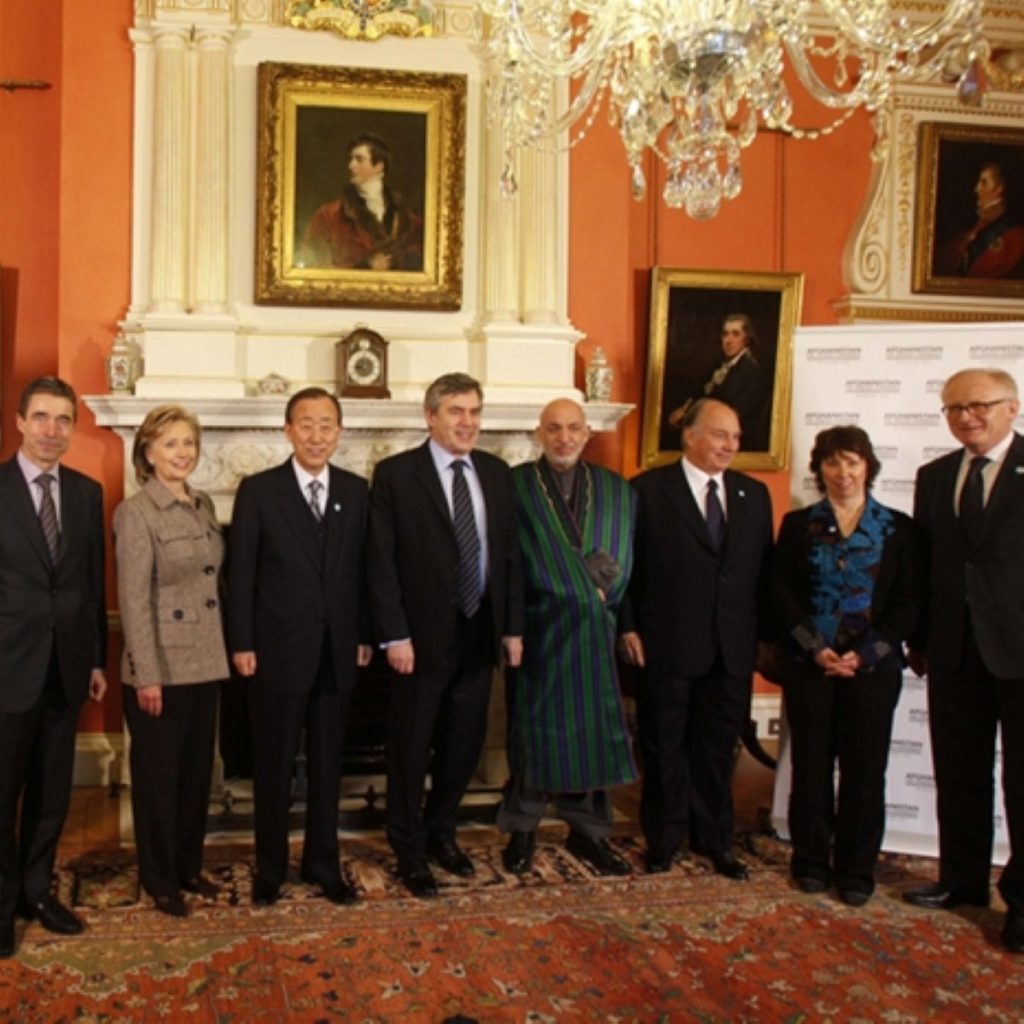Promises flow at Afghanistan conference
Afghanistan’s president Hamid Karzai pledged action on anti-corruption and reconciliation with the Taliban at today’s London conference.
Plans for the establishment of a national peace and reintegration programme and a “grand peace jirga” were unveiled, alongside debt cancellation plans as world leaders met in the capital.
Mr Karzai co-hosted the summit alongside United Nations secretary-general Ban Ki-moon and prime minister Gordon Brown. All three addressed the conference this morning as they focus on its key themes of security, governance and development and regional issues.


“This is a decisive time for the international cooperation that is helping the Afghan people secure and govern their own country,” Mr Brown said.
“For this conference marks the beginning of the transition process, agreeing the necessary conditions under which we can begin… the transferring of responsibility for security from international forces to Afghan forces and Afghan people.”
Mr Ban urged Mr Karzai to “take the lead on transferring commitments into reality” before the Afghan president pledged to “work hard” to that end.
“We are determined to put an end to the culture of impunity as we move along the path of rule of law and democracy,” he said, on anti-corruption.
On reintegration efforts, he added: “We must reach out to all our countrymen – especially our disenchanted brothers who are not part of al-Qaida or any terrorist networks.”
The conference marks the start of the ‘transition’ period in which control over Afghanistan’s 34 provinces will slowly be transferred from International Security Assistance Force (Isaf) to Afghan control.
Proposals for at least five provinces to be returned to Afghan control by early 2011 were released as part of the conference’s communiqué.
Analysis: The elaborate Afghanistan conference ritual
The document did not refer to ‘withdrawal’, however, as Afghan officials are deeply concerned western forces will remove their troops prematurely – as has happened twice in the past 25 years, diplomats point out.
It is also likely to avoid setting out the indicative timetables for drawdown. The British government prefers “end states to end dates”, a Foreign Office official said. So does the Afghan government.
One of the most controversial elements for discussion was the establishment of the reconciliation programme, likely to be controlled by Mr Karzai’s administration, which will encourage non-ideological Taliban fighters to defect.
It is not yet clear whether these defectors will be given roles in predominantly the security, agricultural or other sectors. The Foreign Office favours the establishment of local defence forces, whereas No 10 appears keener on agricultural options. The communiqué did not specify which was preferred.
” target=”_blank”>Video: British soldiers in Afghanistan
Anti-corruption proposals, the training of Afghan national security forces and cancellation of Afghan debt worth $1.6 billion were agreed.
Among the other attendees were US secretary of state Hillary Clinton, Nato secretary-general Anders Fogh Rasmussen, the EU’s high representative for foreign affairs Baroness Ashton and representatives of the World Bank and International Monetary Fund.
After uncertainty from the Iranian government about the extent of its interest in the conference, Tehran has confirmed foreign minister Manouchehr Mottaki was not present, however.
Foreign Office regrets Iran snub
The day began with a working breakfast in No 10 Downing Street before the conference proper begins at Lancaster House in central London.
After opening remarks from Mr Brown, Mr Ban and Mr Karzai the plenary sessions continued after lunch. By mid-afternoon the communiqué was published.
“Today’s conference represents a decisive step towards greater Afghan leadership to secure, stabilise and develop Afghanistan,” it stated.
“The international community underlined its support for the government of Afghanistan and its security, development and governance.”
Officials representing the international community had been concerned the Afghan president might demonstrate reluctance to be pushed too far on governance issues.
But Paul Cornish, head of Chatham House’s international security programme, said that relations between Mr Karzai’s government and the international community faced inevitable tensions.
“If those mechanisms of power and authority are too easily seen to be controlled by Isaf, then the problem is they lose their legitimacy and authority,” he told politics.co.uk.
“It has to be this dual arrangement – the mechanisms are provided from the outside but there has to be a willingness from Karzai to take control of it…. their support has no meaning without Karzai’s leadership.”
Today’s conference on Afghanistan was preceded by a two-hour meeting on Yemen yesterday afternoon in the Foreign Office.
The 21 attending countries agreed to establish a Friends of Yemen group in a bid to prevent the unstable Middle Eastern state becoming, like Afghanistan, a major safe haven for al-Qaida.

